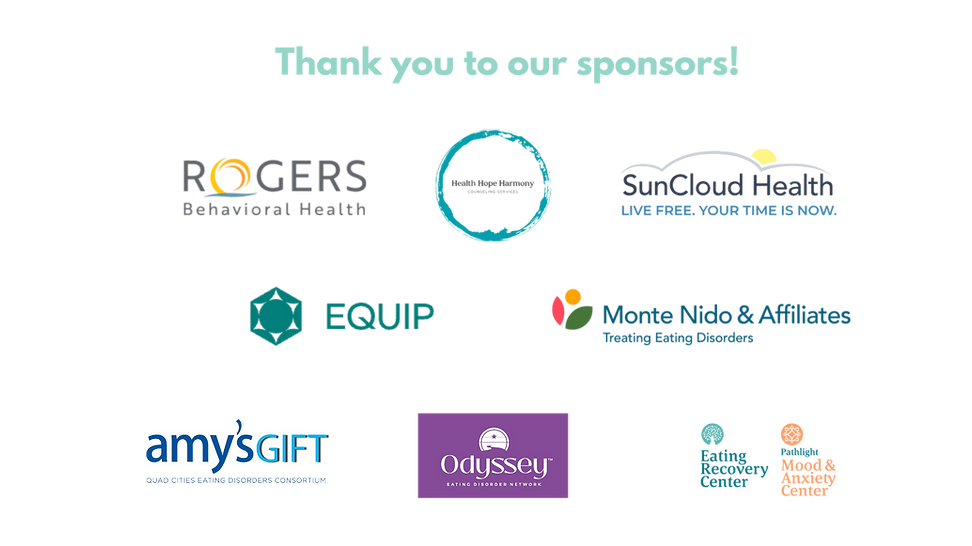

Purpose: A full day of live, didactic and interactive presentations with a focus on advanced topics in eating disorders treatment.
Intended Audience: Health care providers including social workers, counselors, psychologists, dietitians and other allied professionals. Individuals in recovery, caregivers, coaches, teachers and community members are welcome to attend for non-CEU participation, teachers and community members are welcome to attend for non-CEU participation.
Registration: All professional participants and the general public can purchase tickets and register for the event at our conference site.Cancellations will be refunded up to one week prior to the event.
Registration Fee for Continuing Education:
General Provider: $120 | EDCI Professional Member: $96
Community Member (no CEU): $30
Earn 6 Credit Hours of Continuing Education!
Check out the line up

What You Need to Know about Psychedelics and Eating Disorders
Elizabeth Wassenaar, MS, MD, DFAPA, CEDS-C
Sponsored by: Eating Recovery Center and Pathlight Mood and Anxiety Center
Psychedelic medications offer a unique and novel intervention for eating disorders. Many states are passing legislation to decriminalize or legalize the therapeutic use of psychedelic medications and clients and families are asking about these options. This presentation will cover the current states of the science, including emerging research on the use of psychedelic medication in the treatment of eating disorders, and give professionals real tools to use with their clients to discuss and consider treatment options safely.
1. Identify the role of psychedelics in the treatment of eating disorders
2. Discuss the current limitations and risks of the use of psychedelic medications
3. Describe how to discuss psychedelic interventions with clients
Dr. Elizabeth Wassenaar is the Regional Medical Director for the West region at Eating Recovery Center and Pathlight Mood and Anxiety Center. She is Board Certified in Adult Psychiatry, Child and Adolescent Psychiatry and completed triple board training at Cincinnati Children’s and the University of Cincinnati in Pediatrics, Adult Psychiatry, and Child and Adolescent Psychiatry. Prior to her clinical career, she completed a Master of Pharmacology from the University of Pennsylvania. Dr. Wassenaar has completed advanced psychotherapy training in psychodynamic psychotherapy, family-based therapy for eating disorders, psychedelic-assisted psychotherapy, and mind-body medicine. She is a distinguished fellow of the American Psychiatric Association and an International Association of Eating Disorder Professionals Certified Eating Disorder Specialist Supervisor

Beyond DNA: Epigenetics, Eating Disorders & Making a Complex Topic More Approachable for Clinicians
Abbie Scott, RDN, LD
Sponsored by: EDCI
This presentation will educate and inform providers on the buzz-worthy (and often misunderstood) topic of Epigenetics, and how this topic relates to the eating disorder and mental healthcare field.
1. Participants will be able to define DNA, genes, genome, and epigenetics and differentiate between these scientific terminologies
2.. Participants will learn current research trends in epigenetics, and how they apply to the eating disorder and mental health fields
3. Participants will identify at least one clinical application for epigenetics knowledge they can use in their professional practice
Abbie (she/her/hers) is an anti-diet Registered Dietitian with over a decade of experience in the nutrition field. She has worked in multiple levels of care at eating disorder treatment centers, and more recently providing outpatient nutrition counseling to her clients. Abbie is passionate about advocacy for ED awareness, prevention, and improved treatment accessibility for Iowans.

When Eating Disorders and Addiction Collide: A Path to Integrated Recovery, Trauma-Informed Solutions for Complex Co-Occurring Disorders
Colleen Kestel MBA, RDN, LDN and Nikki Bishop, PsyD
Sponsored by: SunCloud Health
Presenters will define eating disorders, give clinical examples of ED in patients with SUD, review prevalence of co-occurring ED and SUD, highlight the clinical significance of underlying trauma, and present the case for unified treatment of patients with co-occurring SUD and ED.
1. Be able to define eating disorders.
2. Be able to recognize the signs and symptoms of ED in SUD clinical population; prevalence co-occurring ED and SUD, and clinical characteristics
3. Be able to recognize and define integrated treatment for ED-SUD co-occurring populations; Treatment principles necessary for patients with ED/SUD, including integrating treatment, medication management (Medication-Assisted therapies as well as medications to avoid in SUD populations)
Dr. Nicole Bishop serves as Clinical Director at SunCloud Health. Dr. Bishop is a licensed Clinical Psychologist. She has extensive experience in treating clients who have a history of trauma/complex trauma, substance use diagnoses and co-occurring disorders. One of Dr. Bishop’s passion’s is working to develop clients and professionals towards becoming their most authentic self in a manner that will enhance the health of a community and a team. Dr. Bishop has substantial knowledge and skill in the area of research and consultation. She has conducted both quantitative and qualitative research in the domains of domestic violence, gender studies, program evaluations, and social justice related topics. Dr. Bishop sees people as humans first and believes every individual has a unique path towards their journey of healing and recovery.
Colleen Kestel has extensive experience working directly with individuals and families across the lifespan, offering support for eating disorders, co-occurring mental health issues, and complex care needs. She believes in a compassionate, inclusive approach that emphasizes gentle nutrition, trauma-informed care, and community connection. In 2022, Colleen co-founded a Joint Commission Accredited IOP and Outpatient Program in Will County, addressing a critical gap in local mental health and eating disorder treatment options. In 2024, Colleen returned to SunCloud Health, where she currently serves as Director of Operations and Compliance. In this dual role, she leads regulatory initiatives, policy development, and program operations—ensuring high standards of care, organizational accountability, and sustainable program growth across all treatment settings.

Applying Acceptance and Commitment Therapy (ACT) in the Treatment of Eating Disorders: A Values-Based, Compassion-Focused Approach
Sabrina Rogers, LMHC, CEDS
Sponsored by: EDCI
This presentation explores the application of Acceptance and Commitment Therapy (ACT) in the treatment of eating disorders across the diagnostic spectrum. Rooted in psychological flexibility and guided by values-based living, ACT offers a powerful, evidence-based approach for helping clients disentangle from unhelpful thoughts and behaviors, including those rooted in diet culture, body shame and perfectionism. This session will cover core ACT principles, their adaptation for eating disorder treatment, and practical interventions for building willingness, reducing experiential avoidance, and fostering self-compassion and recovery. Attendees will leave with actionable tools and case examples relevant for individual and group settings.
1. Identify and explain the six core processes of ACT and how they apply to eating disorder treatment
2, Describe how experiential avoidance and cognitive fusion sustain disordered eating behaviors
3, Apply at least two ACT-based interventions to promote psychological flexibility in clients with eating disorders
4. Demonstrate how to incorporate values clarification into recovery work to support long-term behavior change
5. Adapt ACT techniques to address body image distress and promote a non-diet, weight-inclusive framework
Sabrina Rogers is a licensed mental health counselor, certified eating disorder specialist, and owner of Health Hope Harmony. In 2023 Sabrina transitioned from a solo provider to owning a group practice where her deep commitment to client-centered care shifted to teaching and supervising provisionally licensed providers and master’s student interns, fostering their growth in the field. Additionally, Sabrina is the author of a 90-day body image journal and the host of a podcast dedicated to mental health and body neutrality. In her free time Sabrina enjoys reading, dancing at Jazzercise, baking, crafts, and in the warmer weather camping, kayaking, and geocaching with her husband, son, and their dog Emrys.

Managing the Medical Complications of Eating Disorders
Aaron Ballantyne, MD
Sponsored by: EDCI
To review the common medical complications of eating disorders, differentiate between complications from restrictive eating and purging, discuss the role of medications in the treatment of eating disorders, and apply this information to activity guidance and level of care determination.
1. Understand and be ready to screen for medical complications of eating disorders
2. Be ready to prescribe commonly used medications for the management of complications associated with eating disorders
3. Apply information about a patient’s medical status to determine appropriate levels of activity for a patient with an eating disorder
4. Use medical status to assist in determining the appropriate level of care for a patient with an eating disorder
Dr. Ballantyne is a 2012 graduate of the University of Iowa Carver College of Medicine. Following medical school, he served in the United States Air Force for 11 years. He completed his residency in Pediatrics at the Naval Medical Center in Portsmouth, Virginia and completed fellowship in Adolescent Medicine at the San Antonio Uniformed Services Health Education Consortium in Texas. He separated from military service in June 2023 and is loving his job and the amazing people he works with at Blank Children’s Hospital/Unity Point Health. Dr. Ballantyne’s clinical interests include adolescent mental health, LGBTQ health, and eating disorders.

Incorporating Faith (Spirituality) in Eating Disorder Treatment
Jessica Ward, MS, RD, LD, CEDS-C
Sponsored by: Selah House and Odyssey ED Network
It is well understood that eating disorders affect both physical and mental health. What about spiritual health? We'll explore how to bring spiritual health into our conversations with clients in a way that can help them further explore their faith/spirituality and help them leverage that for recovery.
1. Participants will be able to explain at least 3 benefits of incorporating faith/spirituality in eating disorder treatment
2. Participants will have 5 ways they can incorporate faith/spirituality into eating disorder treatment
3. Participants will experience their own opportunity to utilize tools and strategies presented
Jessica Ward graduated from Gannon University with a Bachelor’s degree in Dietetics and earned a Master of Science in Wellness Management from Ball State University. With over 15 years of experience at Selah House as a dietitian and leader, she has presented to numerous professional audiences and taught a course on eating disorders at Anderson University for several years. Jessica is an active member of the Eating Disorders Task Force of Indiana, the Indiana Academy of Nutrition and Dietetics, the International Federation of Eating Disorder Dietitians, and the International Association of Eating Disorder Professionals. Her passion for her profession and clients is evident in every interaction.

Schedule
8:00-8:20am
Check-In
8:30-9:30am
What You Need to Know about Psychedelics and Eating Disorders
9:45-10:45am
Beyond DNA: Epigenetics, Eating Disorders & Making a Complex Topic More Approachable for Clinicians
11:00-12:00pm
Applying Acceptance and Commitment Therapy (ACT) in the Treatment of Eating Disorders: A Values-Based, Compassion-Focused Approach
12:00-1:00pm
Lunch Provided
1:00-2:00pm
When Eating Disorders and Addiction Collide: A Path to Integrated Recovery, Trauma-Informed Solutions for Complex Co-Occurring Disorders
2:15-3:15pm
Managing the Medical Complications of Eating Disorders
3:30-4:30pm
Incorporating Faith (Spirituality) in Eating Disorder Treatment
.png)
